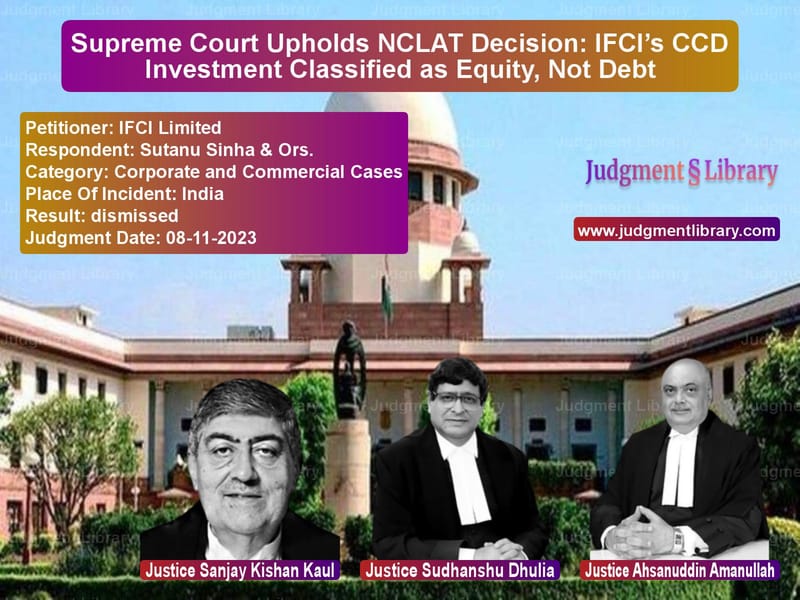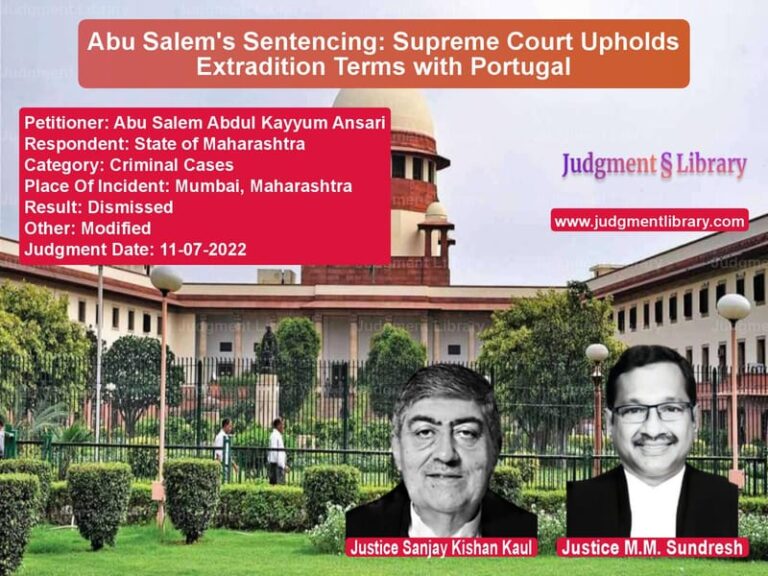Supreme Court Upholds NCLAT Decision: IFCI’s CCD Investment Classified as Equity, Not Debt
The Supreme Court of India recently adjudicated on a significant corporate insolvency dispute in the case of IFCI Limited v. Sutanu Sinha & Ors.. The judgment clarified the nature of Compulsorily Convertible Debentures (CCDs) and their classification under the Insolvency and Bankruptcy Code, 2016 (IBC). The ruling has far-reaching implications for financial institutions and investors in infrastructure projects who structure their investments through hybrid instruments like CCDs.
Background of the Case
The dispute centered around a highway infrastructure project awarded by the National Highways Authority of India (NHAI) to IVRCL Chengapalli Tollways Ltd. (ICTL), a subsidiary of IVRCL. To finance the project, ICTL secured funding through a mix of equity and debt. The appellant, IFCI Limited, subscribed to CCDs worth ₹1,250 crores as part of the project’s equity component under a Debenture Subscription Agreement (DSA) dated October 14, 2011.
Key Legal Issues
- Whether the investment by IFCI through CCDs should be classified as debt or equity under the IBC.
- Whether IFCI was a financial creditor entitled to repayment under the insolvency resolution process.
- Whether the National Company Law Tribunal (NCLT) and the National Company Law Appellate Tribunal (NCLAT) erred in rejecting IFCI’s claim as a financial debt.
Arguments by IFCI (Appellant)
IFCI argued that:
- Although the CCDs were structured as equity, they were in essence a debt instrument since they carried a fixed return of 11% interest per annum.
- The failure of ICTL to honor its repayment obligations triggered the put option, thereby converting the investment into a debt.
- Despite the compulsory conversion provision, the failure to issue shares upon maturity in 2017 left IFCI without a legal remedy, making it a financial creditor.
- The resolution professional wrongly rejected IFCI’s claim, causing an unfair loss as other creditors received priority in repayments.
Arguments by Respondents (Resolution Professional & NHAI)
The respondents contended that:
- The CCDs were explicitly categorized as equity in the financing agreements and were part of the required debt-equity ratio.
- The investment by IFCI was not a loan but an equity infusion that carried inherent risks and rewards.
- There was no contractual recategorization of CCDs from equity to debt, and IFCI never obtained NHAI’s approval for such a conversion.
- The debt definition under Section 3(11) of the IBC does not cover CCDs, as they do not involve an obligation for repayment by the debtor.
Supreme Court’s Analysis
1. Nature of CCDs: Debt vs. Equity
The Supreme Court analyzed the fundamental nature of CCDs and cited In re Crompton & Co. Ltd. (1914), which recognized that traditional debentures created a floating charge on assets. However, the Court clarified:
Read also: https://judgmentlibrary.com/supreme-court-holds-nclat-members-in-contempt-for-ignoring-its-order/
“Compulsorily Convertible Debentures do not postulate any repayment of principal. They are fundamentally an equity instrument where the return is linked to the company’s performance rather than a fixed repayment obligation.”
2. IFCI’s Role as a Financial Creditor
The Court held that to be classified as a financial creditor, a party must establish that the claim is based on a debt obligation. It ruled:
“The definition of debt under Section 3(11) of IBC includes a liability or obligation in respect of a claim. Since ICTL never had a liability to repay IFCI, the CCDs cannot be considered a financial debt.”
The Court noted that the Waterfall Mechanism under Section 53 of the IBC prioritizes financial creditors over equity holders, and treating IFCI as a creditor would unfairly elevate it over other shareholders.
3. Contractual Obligations and Lenders’ Approval
The Court examined the contractual framework and observed:
- The Concession Agreement with NHAI explicitly categorized CCDs as equity.
- IFCI did not seek lender approval to reclassify CCDs as debt.
- The contract’s put option mechanism was not exercised by IFCI, further affirming the intent to treat CCDs as equity.
4. NCLAT’s Rationale
The Supreme Court affirmed NCLAT’s finding that:
- Reclassifying CCDs as debt would breach the concession and loan agreements.
- There was no event triggering a recategorization from equity to debt.
- IFCI had exhausted legal remedies against the sponsor company, IVRCL, but could not recover anything due to its insolvency.
Final Judgment
The Supreme Court upheld the NCLT and NCLAT orders, ruling:
- IFCI’s CCDs were equity and not debt, and therefore, its claim as a financial creditor was rightly rejected.
- IFCI’s legal remedies lay with IVRCL and not with the Corporate Debtor (ICTL).
- The appeal was dismissed, with each party bearing its own costs.
Conclusion
This judgment reinforces the principles of contractual sanctity and the importance of clearly defining investment instruments in project finance. The ruling provides clarity on:
- How CCDs are classified under insolvency laws.
- The distinction between financial creditors and equity investors in IBC proceedings.
- The necessity of obtaining lender approvals before altering the nature of investments.
For financial institutions and investors, this judgment serves as a crucial reminder to carefully structure investment instruments and ensure alignment with contractual obligations to avoid adverse legal outcomes in insolvency proceedings.
Petitioner Name: IFCI Limited.Respondent Name: Sutanu Sinha & Ors..Judgment By: Justice Sanjay Kishan Kaul, Justice Sudhanshu Dhulia, Justice Ahsanuddin Amanullah.Place Of Incident: India.Judgment Date: 08-11-2023.
Don’t miss out on the full details! Download the complete judgment in PDF format below and gain valuable insights instantly!
Download Judgment: ifci-limited-vs-sutanu-sinha-&-ors.-supreme-court-of-india-judgment-dated-08-11-2023.pdf
Directly Download Judgment: Directly download this Judgment
See all petitions in Bankruptcy and Insolvency
See all petitions in Corporate Governance
See all petitions in Company Law
See all petitions in Shareholder Disputes
See all petitions in Corporate Compliance
See all petitions in Judgment by Sanjay Kishan Kaul
See all petitions in Judgment by Sudhanshu Dhulia
See all petitions in Judgment by Ahsanuddin Amanullah
See all petitions in dismissed
See all petitions in supreme court of India judgments November 2023
See all petitions in 2023 judgments
See all posts in Corporate and Commercial Cases Category
See all allowed petitions in Corporate and Commercial Cases Category
See all Dismissed petitions in Corporate and Commercial Cases Category
See all partially allowed petitions in Corporate and Commercial Cases Category







